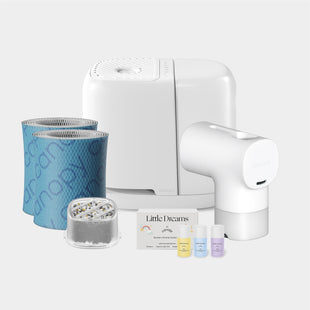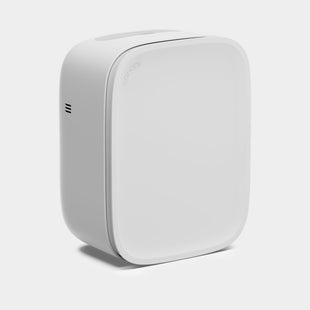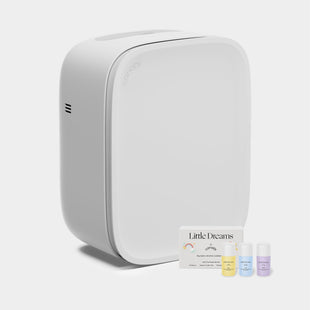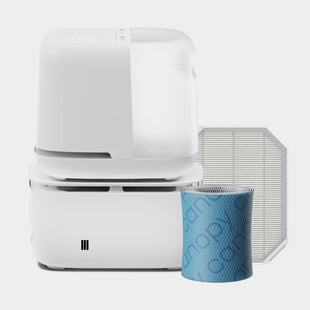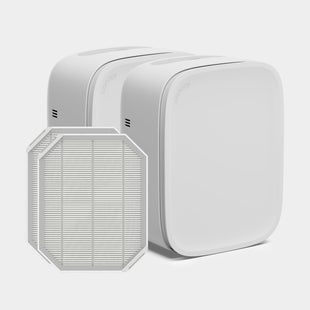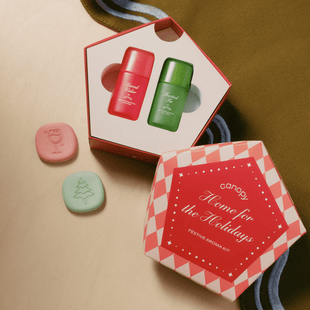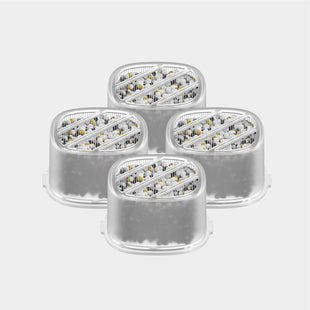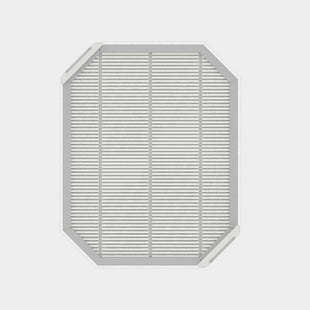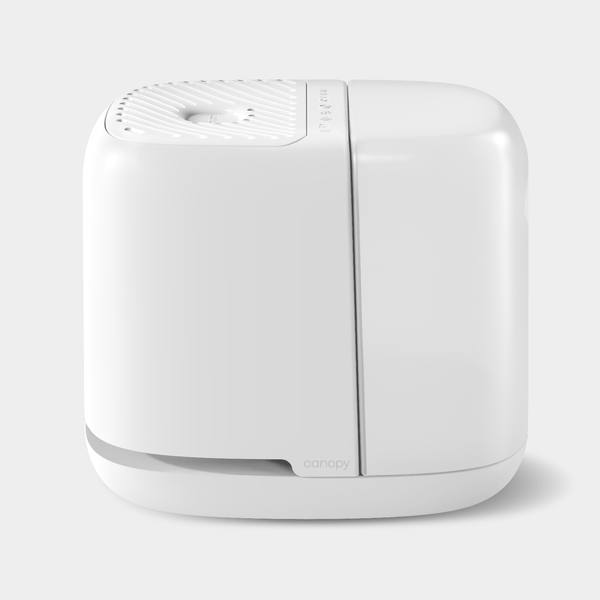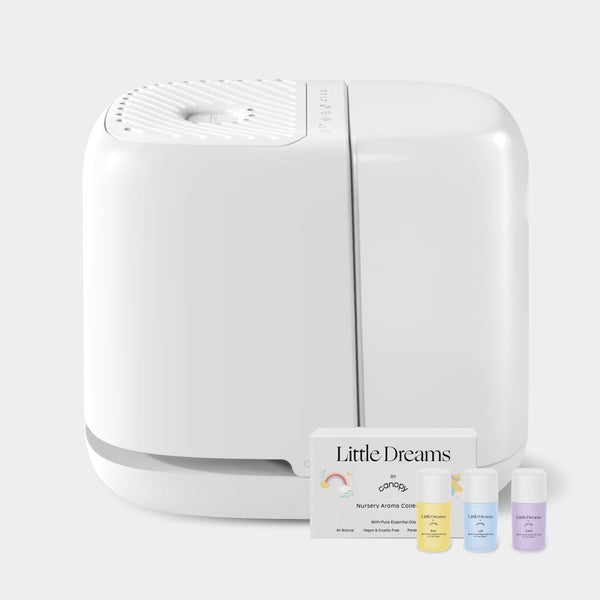Whether you live in a sunny apartment or a cozy family home, you probably think about lighting, blankets, or plants when creating comfort. But did you know that the air you breathe matters just as much? Too dry, and you wake up feeling scratchy and parched; too moist, and you risk musty odors and stuffiness. Luckily, you can create the perfect balance with a humidifier or air purifier. Here's a quick guide to what each one does, how they work together, and how to choose the right fit for your lifestyle.
What Is a Humidifier?
When the air is too dry, your skin can feel tight, your throat irritated, and your sleep less restful. A humidifier adds just the right amount of moisture back into the air, creating an environment that feels gentler, cozier, and easier to breathe in.
Most experts recommend around 30% to 50% indoor humidity, which should be enough to keep your skin dewy and your airways happy without promoting mold growth or stuffiness1. To strike that perfect balance, Canopy humidifiers use clean, filtered airflow to deliver invisible hydration day and night. Here's a closer look at how each model transforms your space.
Canopy Bedside Humidifier 2.0
The Canopy Bedside Humidifier hydrates up to 500 square feet, making it perfect for bedrooms and personal spaces. Designed with your wellness routine in mind, it delivers mist-free, filtered hydration, so you can skip the damp walls and condensation that come with traditional humidifiers. You can also personalize your environment with sleep-friendly features like a dimmable red light, warm reading light, and soothing white noise to promote deeper rest.
Canopy Nursery Humidifier 2.0
The Canopy Nursery Humidifier brings the same smart, mold-inhibiting technology to your child's room. With a 36-hour run time, it uses UV light and a proprietary filter system to support better sleep and easier breathing. The Smart Persistent Airflow™ feature helps keep the interior dry and fresh between uses, while backlit controls make adjustments in the middle of the night easy. The dimmable nightlights add a touch of gentle relaxation, creating a soothing environment that helps your baby rest soundly.
Large Room Humidifier
The Canopy Large Room Humidifier delivers all of this on a bigger scale, providing a sleek and modern addition to your family areas. Designed for up to 1,000 square feet, it keeps open layouts and shared living spaces feeling balanced and refreshed. Like every Canopy humidifier, it features dual filtration that removes dust, particles, and waterborne contaminants before releasing clean, mist-free moisture into the air. Despite its larger size, it's easy to maintain with tap-water compatibility, extended runtime, and a filter replacement every six weeks.
What Is an Air Purifier?

Every day, microscopic particles like dust, pollen, pet dander, and household odors float around your space and reduce freshness without you even noticing. By drawing in the air and pulling it through a powerful filtration system, an air purifier captures pollutants and recirculates cleaner, crisper air back into the room, helping your space feel lighter, fresher, and more inviting2.
Whether you're dealing with lingering cooking smells, city air drifting through the windows, or pet hair clinging everywhere, a purifier works in the background to remove what doesn't belong so you can breathe easier. Canopy offers two thoughtfully designed options.
Canopy Bedside Air Purifier
The Canopy Bedside Air Purifier delivers powerful purification in a compact, beautifully minimal form. Its multistage HEPA-13 filtration captures up to 99.97% of dust, pollen, smoke, and other airborne particles as small as 0.3 microns. Real-time air quality monitoring automatically adjusts the fan speed to meet your environment's needs, while the three manual fan settings let you adjust airflow to your liking. In a recent consumer study*, 91% of users agreed their air felt noticeably fresher and cleaner after using Canopy, and 78% said their sleep quality improved.
*Based on an external Consumer Perception Study of 47 participants, after 30 days. Results may vary.
Canopy Nursery Air Purifier
Using the same multistage HEPA-13 filtration system, the Canopy Nursery Air Purifier captures up to 99.97% of dust, dander, pollen, and odors to help build a gentler, healthier environment for your little one. The whisper-quiet fan and Sleep-Safe Auto Mode maintain steady airflow without disruptions, so your baby can rest easier. About 95% of parents who tested it said it helped them create a better environment for their child, and 86% saw their little ones sleeping more soundly and showing fewer signs of sniffles or irritation*, making it a must-have for families.
*Based on an external Consumer Perception Study of 25 parents, after 30 days. Results may vary.
Air Purifier vs Humidifier: How Do I Know Which Device I Need?
Is an air purifier the same as a humidifier? No. So what's the difference between a humidifier and an air purifier? A humidifier and an air purifier serve different purposes: one adds clean moisture to dry air, while the other removes airborne particles that can trigger allergies and irritation. The right choice comes down to your space, your health, and your needs.
Humidification is especially game-changing during the fall and winter, when indoor heating zaps moisture from the air. That's when you may notice your skin feels tighter, your throat gets scratchy, and your sleep takes a hit. A humidifier helps restore balance, keeping your air comfortably hydrated and your environment softer and cozier. Come spring and summer, an air purifier helps clear pollen and outdoor pollutants that drift in through open windows, keeping city air, smoke, and other allergens from irritating your sinuses3.
When in doubt, consider whether it's dryness or dust that bothers you the most. If the air feels harsh and your skin or throat is uncomfortable, start with a humidifier. If you're battling congestion, odors, or allergy flare ups, reach for an air purifier.
Is it Worth Having Both a Humidifier and an Air Purifier?
In many homes, yes. Since a purifier removes airborne particles and a humidifier balances moisture levels, they complement each other beautifully. An air purifier can make the air feel cleaner but also drier, so running a humidifier alongside it helps restore comfort and prevent irritation.
The two devices also work symbiotically against allergens. Moisture helps weigh down particles like dust and pollen so they settle faster, while the purifier captures and removes them before they can recirculate. Together, a purifier filters out pollutants that cause nasal irritation and inflammation, while a humidifier keeps your airways hydrated and your skin dewy4.
Improve Your Air Quality with Canopy Humidifiers & Air Purifiers
Canopy humidifiers and air purifiers can make a noticeable difference in daily comfort. Our Wellness Tower offers the best of both worlds, with the Bedside Humidifier and Bedside Air Purifier in one convenient bundle. Browse all our humidification and air purification devices and accessories to find the right combination for your home. Because when your air feels better, your whole day feels better.
Sources:
- Mayo Clinic Staff. (June 21, 2023). Humidifiers: Ease Skin, Breathing Symptoms. Mayo Foundation for Medical Education and Research. Retrieved October 14, 2025, from https://www.mayoclinic.org/diseases-conditions/common-cold/in-depth/humidifiers/art-20048021
- Cherney, K., & Lamoreux, K. (March 24, 2025). Do Air Purifiers Actually Work? Healthline. Retrieved October 19, 2025, from https://www.healthline.com/health/allergies/do-air-purifiers-work
- (May 26, 2022). How to Avoid Allergy and Asthma Triggers During Outdoor Parties and Cookouts. Allergy and Asthma Foundation of America. Retrieved October 19, 2025, from https://community.aafa.org/blog/how-to-avoid-allergy-and-asthma-triggers-during-outdoor-holiday-celebrations
- (January 10, 2025). 4 Ways a Humidifier Can Improve Your Health. Cleveland Clinic. Retrieved October 19, 2025, from https://health.clevelandclinic.org/how-you-can-tell-if-you-need-a-humidifier









